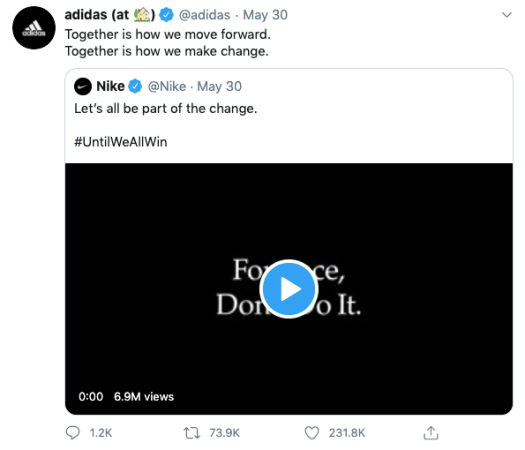
Running such a powerful and successful campaign is only possible if you work with long-standing trusted partners and have detailed and almost instant knowledge of your target audience, a deep understanding of your consumer base, the intuition of when and how to speak to them. And if you are in deep empathy with their values and priorities.
Nike’s prompt and iconic anti-racism ad in May 2020 is a positive sign of how brands can contribute to the popular political and societal discourse and help drive change.
Above all, it’s a perfect example of what brand communication should be, focused on its purpose and its target audience. We already know that it will most likely have a positive impact on brand equity and Nike sales. How can we predict it?
When Nike took a stand with its Kaepernick campaign in September 2018, online sales increased by 31% over the crucial Labour Day Holiday according to times.com.
Conversely, Gillette’s Toxic Masculinity Campaign last year, which was not in tune with the values of its consumers, led to a drop in sales.

In the beautifully executed ad by Wieden & Kennedy Portland, Nike’s long-time agency, the iconic slogan ‘Just do it’ becomes ‘For Once, Don’t Do It…’ and a sequence of white words on a black screen encourages viewers to take a stand against racism in America.
Right after launching the ad already went massively viral with 35,000 retweets and two million views only a few hours after its publication. Even its main competitor Adidas retweeted the ad.

The Nike ad is not just an act of high moral character. The message is in line with Nike’s consumers. According to Glocalities data from 2020, American users of Nike are more likely than average to support Black Lives Matter.
Aligning a brand with the ethical values of its consumers creates or strengthens the vital emotional bond between consumers and a brand. This bond creates loyalty but also adds a lot of intangibility which has a beneficial effect on brand equity, the intrinsic value of the brand and its ability to generate added value in the long term.
In conclusion, a brand – or business – communication has to be authentic and real and remain focused on what its consumers – or customers – value most in life.
The brand message should be about the consumer and not about the brand – or product. It sounds obvious but this is quite difficult to achieve. It gets a little bit easier with strong and substantiated consumer insights combined with an articulated marketing strategy.
Together with Glocalities, beez can help you build sustainable growth thanks to its co-creation approach based on customer-centricity and collective intelligence.